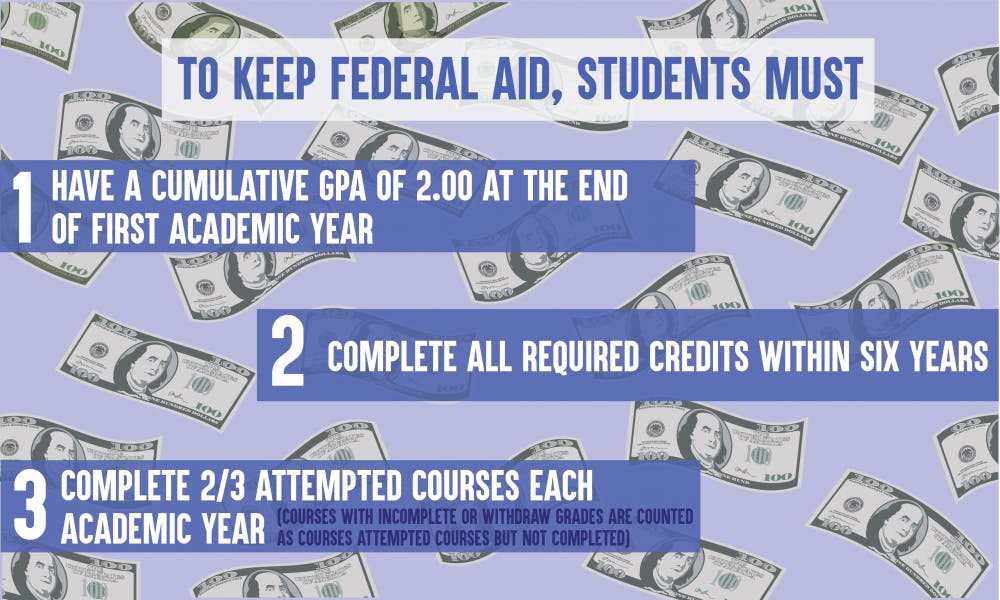
While navigating federal financial aid, students are expected to keep their academic performance in check. Students struggling with their academic work may find their federal aid in jeopardy, and although Penn has some measures to prevent them from losing their aid, many students are unaware of these federal guidelines and the resources Penn offers.
To receive aid programs, such as the Pell Grant and work study, students must meet their school's Satisfactory Academic Progress demands, a policy which is federally required. For Penn students pursuing a bachelor’s degree, maintaining Satisfactory Academic Progress requires students to keep a minimum cumulative GPA of 2.0, complete all required credits within six years, and successfully complete at least two thirds of the courses attempted in an academic year.
Wharton and College sophomore Saxon Bryant said he was not aware of the University's SAP policy, which he said has not come up in discussions with his financial advisors. Most conversations with Student Financial Services tend to be "focused on aid and not on academics," Bryant said, adding that concerns about academics and their ties to financial aid are common across first-generation, low-income students.
“If you’re going through a tough semester or if there’s some sort of need on your life requiring more of you, you don’t have the luxury of thinking of more than still staying in your classes and still staying on top on your grades,” Bryant said. “You no longer have the full array of options afforded to many students to be your best self.”
FGLI students experience aspects of academic pressure that are unique to their background, Penn First Advocacy Chair and College senior Lyndsi Burcham said.
"You're probably here because you want to uplift your family in some way or improve the future of your future family," Burcham said. "There’s a lot of pressure to do well so you can be successful and change the narrative of your family."
Students who fail to meet SAP by the end of one academic year will not be eligible for federal aid the following year, Varas said. Penn also does not provide additional institutional funding to replace federal grant money if a student fails to meet SAP.
SFS sends a “warning letter” to students who do not meet SAP by the end of one semester, which is not required by federal law. Paul Richards, director of communications in the Division of Finance, said, however, it is rare for the University to send these letters. These students are then able to improve their standing the following semester to keep their aid.
Nearly 50 percent of Penn undergraduates receive financial aid. Because Penn has a need-based aid policy, many students receive a combination of federal and University funding, Senior University Director of Financial Aid Elaine Papas-Varas said.

Papas-Varas said SFS and the undergraduate schools review each student’s situation individually, on a nearly case-by-case basis. Students who lose their aid may also follow an appeals process, which allows them to describe any extenuating circumstances they experienced over the academic year.
“If something happened that’s detrimental to the student or family that prevented them from being successful — serious illness, death in the family, major catastrophe that impacted home or — all those things are taken into consideration,” Varas said.
While some FGLI students have also expressed worry that they would lose their aid if they took a leave of absence, Varas said a leave of absence is not counted within the six years they are required to finish their undergraduate studies under federal law.
“[Leave of absence] doesn’t get counted in the maximum time frame," Varas said. "They’re not getting aid in those years. However long or however many they take, it doesn’t get charged against them. The clock starts again when they return to school.”
Nursing sophomore Sydney Steward said she was unaware of the academic requirements for federal aid, and urged SFS to be more transparent about SAP.
"I’d like to see the statistics for how many people who go under the microscope to get their case analyzed are actually able to able to go back to school," Steward added.
Wharton freshman Elijah Fullerton, who identifies as highly aided, said that even students who were not at immediate risk of losing their aid have felt nervous about these federal mandates.
“I feel that even though I’m far removed from being at risk, the mindset is so pervasive that even though you’re doing well, you have this massive anxiety hanging over your head,” Fullerton said. “People here are already working to achieve the highest GPA they can.”
Bryant said he believes academic and financial aid advisors should work together more often to prevent students from losing their aid and inform them about these policies.
"For me personally there hasn’t been a lot of overlap," he said. "If I have a tough course load, my financial aid doesn’t know that. If my financial situation is in a rough spot, my academic advisor isn't aware. There’s no way I can get some holistic advice. I’m not sure how to remedy that."
The Daily Pennsylvanian is an independent, student-run newspaper. Please consider making a donation to support the coverage that shapes the University. Your generosity ensures a future of strong journalism at Penn.
Donate




